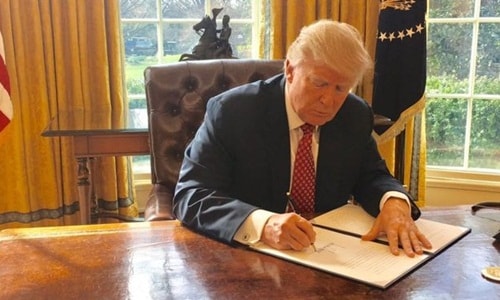Controversy over Trump's new immigration ban
After President Donald Trump signed a revised immigration order, experts are still not sure it will make America safer.
 |
US President Donald Trump signs revised immigration ban. Photo: White House |
On March 6, in an effort to allay political and legal concerns, US President Donald Trump signed an executive order effective March 16 banning entry for citizens from six Muslim-majority countries: Iran, Syria, Somalia, Sudan, Yemen and Libya for a period of 90 days. These are 6 of the 7 Muslim-majority countries that Trump's first travel ban mentioned.
The new order does not apply to people who already have visas to enter the US, permanent residents of the US and reduces the indefinite ban on Syrian refugees to 120 days.
Although the new order has notable changes, some experts say its purpose is the same as the previous travel ban that was blocked by the courts, according to the Daily Signal.
Hard to make America safer
US Secretary of State Rex Tillerson announces new entry ban
Still, many security and diplomatic experts remain skeptical that the revised travel ban is aimed at foreign nationals from countries that were considered terrorist threats under former President Barack Obama and Congress, given that recent terrorist attacks on the United States have been carried out by U.S. citizens or permanent residents.
“The Trump administration has removed all the content that the court objected to, which is good news,” said James Jeffrey, a former US ambassador to Iraq and deputy national security adviser under President George W. Bush.
The revised order “doesn’t contain anything illegal or objectionable. But the substance of the new travel ban is trivial anyway,” Jeffrey, now a scholar at the Washington Institute for Near East Policy, said in an interview with the Daily Signal. “There’s not much in this order that makes America safer,” he said.
Big step forward
Observers say the new order addresses many concerns raised by Trump's first travel ban five weeks ago. Federal courts have blocked the order. Critics say it caused chaos at airports. Some have dubbed it a "Muslim ban."
Jeffrey, like other experts, welcomed the Trump administration’s removal of Iraq from the list of Muslim countries whose citizens are banned from entering the United States. According to him, the move is significant because Baghdad is cooperating with Washington to fight the Islamic State (IS) militants.
"Removing Iraq is a big step. Most of the remaining governments on the list are either adversaries, weakened or unwilling to cooperate with the United States," said Michael O'Hanlon, a foreign policy scholar at the Brookings Institution.
The new entry restriction order does not apply to citizens from six countries: Iran, Syria, Somalia, Sudan, Yemen and Libya who were granted visas to enter the US before January 27 or have become US permanent residents.
"This amendment demonstrates that the focus of the revised travel ban is on responding to the emerging threat of foreign fighters moving out of their home regions into the United States rather than punishing or ostracizing Muslims," said James Carafano, a security expert at the Heritage Foundation in Washington. "It is noteworthy that the administration is making an effort to admit those who already have visas to ensure they are treated fairly and not punished by a plan focused on future threats."
Immigration crisis continues
Protest outside the White House after Trump's immigration ban
Critics of Trump's new immigration ban argue that there have been no recent terrorist attacks in the United States by citizens from the six Muslim-majority countries of Iran, Syria, Somalia, Sudan, Yemen and Libya.
Citizens from these countries have also not killed anyone on US soil. The latest report from the Department of Homeland Security concluded that "a person's nationality is unlikely to be a reliable indicator of their potential terrorist activity."
The Trump administration has disputed the report's conclusions, saying it is misleading and ignores classified information that points to a more dangerous threat.
“If you look at the six countries whose citizens are banned, you can see that these are countries that are either in civil war or sponsor terrorism,” said Jonathan Schanzer, an analyst at the US Department of Justice. “From that perspective, you can understand why there is increased scrutiny of immigrants or visitors from these countries.”
At a press conference on the afternoon of March 6, White House press secretary Sean Spicer said the list of six countries could be expanded if the US government, after reviewing its inspection procedures, found shortcomings in information collection and sharing.
Under the new immigration order, the Department of Homeland Security, the Department of State, the Office of National Intelligence, and the Department of Justice will jointly develop uniform vetting standards for all immigration programs that apply broadly.
Mr. Schanzer assessed that the US and the West will continue to face challenges related to the flow of immigrants and refugees from countries being devastated by terrorism unless the US does more to help resolve key conflicts.
"We would not be dealing with this wave of immigration if it were not for the conflicts that are happening across the Middle East. We are not making any effort to resolve these conflicts. If we cannot resolve the conflicts, the immigration crisis will continue," Schanzer stressed.
According toHong Van/ VNE
| RELATED NEWS |
|---|

